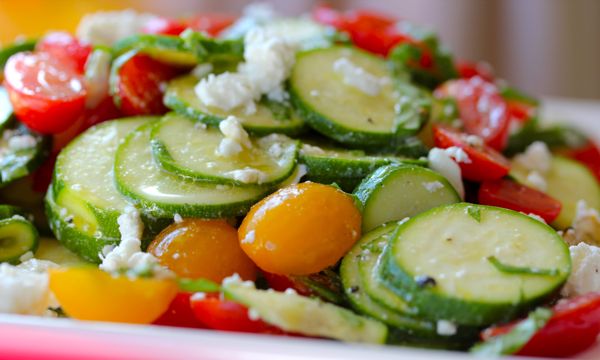
AYURVEDIC FOODS
Table of ContentsHow Does This Ayurvedic Food Improve Wellness?
CLINICAL AYURVEDIC REVIEW
Cooking Summer SquashNothing is easier to make or more readily available at the grocery store than summer squash. Add to any stir fry, curry, or rice based dish. You may simply slice, drizzle with ghee, salt and pepper and roast it for a lovely side dish. Or slice vertically, hollow out the seeds, and fill with ghee, diced bell peppers and onions, and place it in the oven for 20 minutes and it can be a main dish.
Learn about the health benefits of summer squash for FREEYou'll receive free access to our entire website including healthy recipes, nutritional diet plans, medicinal uses of ingredients, & ayurvedic health tips. Sign in once and you can use our website indefinitely..Is Summer Squash Good for My Ayurvedic Diet?Find out by taking this free, easy quiz. You'll learn your body type, and whether 'Summer Squash' is a good fit. Complete the basic quiz in 1 minute, or go deeper with additional quizzes at your own leisure to learn more about your body.AYURVEDA'S GUIDE TO VITALITY & WHOLESOME NOURISHMENTYour Ayurvedic diet is tailored to your individual body and your specific imbalances. With an Ayurvedic diet you feel joy and satisfaction because what you are eating truly nourishes and balances you. Disease results from diets and lifestyles that are incompatible with your nature. By eating a personalized diet matched to your body, you experience optimal health. See How it Works.SERVING SIZE: 1/2 c SPECIES: Cucurbita pepo FAMILY:
Cucurbitaceae EAT IN: Metabolic Nature of Summer Squash
Foods with a Similar Nature to Summer SquashHoney Dew Honey Dew has these Actions in CommonQuenches-thirst, Relieves-burning, DiureticWater Water has these Actions in CommonQuenches-thirst, Relieves-burningCucumber Cucumber has these Actions in CommonDiuretic, Quenches-thirstHibiscus Hibiscus has these Actions in CommonDiuretic, Relieves-burningJackfruit Jackfruit has these Actions in CommonRelieves-burning, Quenches-thirstGrape Grape has these Actions in CommonDiuretic, Quenches-thirstPopcorn Popcorn has these Actions in CommonDiureticZucchini Zucchini has these Actions in CommonDiureticPickle (Cucumber) Pickle (Cucumber) has these Actions in CommonDiureticCollard Greens Collard Greens has these Actions in CommonDiureticHerb Supplements with a Similar Nature to Summer SquashAmritarishta (Amrutharishtam) Amritarishta (Amrutharishtam) has these Actions in CommonDiuretic, Quenches-thirst, Relieves-burningKutaja Bark Kutaja Bark has these Actions in CommonRelieves-burning, DiureticRed Clover Red Clover has these Actions in CommonDiuretic, Relieves-burningYucca Yucca has these Actions in CommonDiureticVaranadi Kashaya Varanadi Kashaya has these Actions in CommonDiureticButcher's Broom Butcher's Broom has these Actions in CommonDiureticChitrak Chitrak has these Actions in CommonDiureticAsparagus root Asparagus root has these Actions in CommonDiureticMayapple Mayapple has these Actions in CommonDiureticCereus, Night Blooming Cactus Cereus, Night Blooming Cactus has these Actions in CommonDiureticElder flower Elder flower has these Actions in CommonDiuretic
Joyful Belly is a recognized school of biocharacteristics medicine. View Other Ingredients for SummerSummer Squash is recommended for Summer. Check out these other Summer foods here.HOW DOES EATING AYURVEDICALLY MAKE YOU FEEL?Eating Ayurvedically makes you feel nourished and energized. Food digests with ease when right for your body type (dosha). Healthy digestion is seen as the cornerstone of well-being in Ayurveda. Healthy digestion generally prevents illness. If you do get sick, a strong digestive fire reduces the severity of illness and increases your resilience. It also improves your mood. Once you begin eating Ayurvedically, you will feel refreshed, vital and strong.Clinical Tools & Resources
About the Author John Immel, the founder of Joyful Belly, teaches people how to have a healthy diet and lifestyle with Ayurveda biocharacteristics. His approach to Ayurveda is clinical, yet exudes an ease which many find enjoyable and insightful. John also directs Joyful Belly's School of Ayurveda, offering professional clinical training in Ayurveda for over 15 years.John's interest in Ayurveda and specialization in digestive tract pathology was inspired by a complex digestive disorder acquired from years of international travel, as well as public service work in South Asia. John's commitment to the detailed study of digestive disorders reflects his zeal to get down to the roots of the problem. His hope and belief in the capacity of each & every client to improve their quality of life is nothing short of a personal passion. John's creativity in the kitchen and delight in cooking for others comes from his family oriented upbringing. In addition to his certification in Ayurveda, John holds a bachelor's degree in mathematics from Harvard University. John enjoys sharing Ayurveda within the context of his Catholic roots, and finds Ayurveda gives him an opportunity to participate in the healing mission of the Church. Jesus expressed God's love by feeding and healing the sick. That kindness is the fundamental ministry of Ayurveda as well. Outside of work, John enjoys spending time with his wife and 7 kids, and pursuing his love of theology, philosophy, and language. Comments & Impressions of 'Summer Squash'Do you like 'summer squash'? Why or why not? What makes it unique? Is there something else you'd like to know about 'summer squash'?     (5.00 out of 5 stars) 1 rating, 328 likes (5.00 out of 5 stars) 1 rating, 328 likes     Sign in to review this food Sign in to review this food
|
Join Joyful Belly.
Want our top Ayurvedic recipes and health tips?Subscribe to our free newsletter!



 On MeWe
On MeWe On Pinterest
On Pinterest On Facebook
On Facebook On Twitter
On Twitter On WhatsApp
On WhatsApp On Email
On Email CREATE A RECIPE WITH IT
CREATE A RECIPE WITH IT COMPARE IT
COMPARE IT







